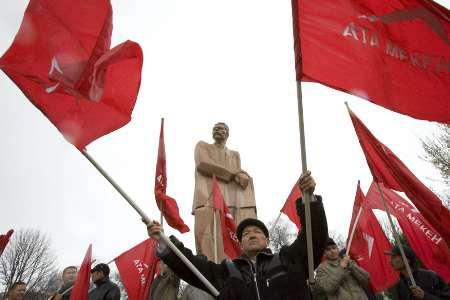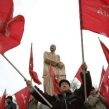
Opposition Remains Divided in Kyrgyzstan Ahead of Presidential Elections
Publication: Eurasia Daily Monitor Volume: 6 Issue: 99
By:

When Kyrgyzstan’s President Kurmanbek Bakiyev announced in March that he will hold early elections on July 23, the opposition saw an opportunity to challenge the regime. Several opposition parties tried to consolidate and nominate a candidate to compete with Bakiyev, despite long being accused of an inability to unite against the regime. After weeks of negotiations, the Kyrgyz opposition chose to nominate Almazbek Atambayev, the leader of the Social Democratic Party and a former prime minister (EDM, April 23).
However, Atambayev was soon challenged by his colleagues from the other opposition parties. Recently, another opposition leader Temir Sariyev, the head of the Ak Shumkar party, announced his decision to run for the presidency. Sariyev decided to stand as the candidate from his party, rather than representing a united opposition movement. With Sariyev’s announcement, the Kyrgyz opposition has been thrown back into division in the run up to the presidential elections.
The main rationale behind nominating one opposition candidate was to prevent the falsification of the elections, through pressuring governmental institutions and organizing mass protests. The candidate nominated had to be nationally popular, as well as possessing a strong financial base in order to maintain high levels of spending before and after the elections. Atambayev and Sariyev both possess these traits, and therefore constitute competition for each other.
Overall, 17 candidates have registered to run for the presidency (www.akipress.kg, May 18). Most of those registered do not represent a serious challenge to the incumbent president. Rather, they regard the prospect of competing in the elections as a mechanism to expand their popularity across the country. The candidates might also see the process as a platform to ensure running again in future elections. While realizing that Bakiyev is unlikely to relinquish power, the registered candidates hope to be recognized in future ballots. Indeed, Atambayev and Tekebayev have run for president several times.
Prior to the announcement of an opposition candidate, the leader of the Ata Meken party Omurbek Tekebayev, was considered as the most likely contender. But as he explained, this was sacrificed in order to preserve the unity of the opposition. Another opposition leader and former defense minister, Ismail Isakov, announced his candidacy, but soon afterwards withdrew his bid for the same reason. This competition amongst the opposition forces shows that none of these parties are currently able to constitute a viable challenge to Bakiyev’s regime. Members of the pro-regime Ak Zhol party are united under the umbrella of the state, and seem disinterested in pursuing change.
If free and fair elections were conducted in Kyrgyzstan, it is unlikely that Bakiyev would secure a majority of the vote. However, it is also doubtful that any of the candidates would gain enough votes to win the elections outright in the first round. Bakiyev will try to present favorable results in the first round of the elections, similar to his Central Asian counterparts who usually win elections by 90 percent. Bakiyev was able to create a regime where few are involved in decision-making, while members of the parliament and government are generally able to act freely, and express their opinions without experiencing any direct pressure -so long as they refrain from supporting the opposition.
The killing of Bakiyev’s former-aide Medet Sadyrkulov in March had briefly shaken the confidence of public employees. Thus far, contrary to the hopes of the opposition leaders, however, no Ak Zhol member has openly defected from the regime. Even the former head of the central elections commission, who last fall accused the regime of threatening herself and her family for failing to cooperate with the authorities, has changed her tone towards Bakiyev. Kabilova has confessed that she was driven by emotion when accusing Bakiyev, but admits that the president has never intended to harm her (www.24.kg, May 13).
The upcoming presidential elections in Kyrgyzstan will represent a considerable financial cost for any opposition candidate seeking to seriously challenge Bakiyev. They will need to combat the Ak Zhol party on all levels – from the central elections commission to the local government and elections observers. If the election results are falsified (a likely scenario) in favor of Bakiyev, that candidate will need to organize open-ended demonstrations in the aftermath of the elections to demand a new vote. Such a candidate would also need to persuade the security structures, led by Bakiyev’s brother Zhanysh to join the opposition. What the opposition will succeed in achieving remains unclear.




